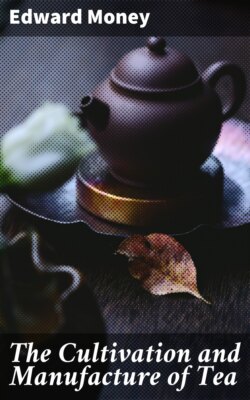Читать книгу The Cultivation and Manufacture of Tea - Edward Money - Страница 6
На сайте Литреса книга снята с продажи.
CHAPTER II.
LABOUR, LOCAL AND IMPORTED.
ОглавлениеTable of Contents
When the very large amount of labour required to carry on a plantation is considered, it is evident that facilities for it are a sine quâ non to success. Assam and Cachar, the two largest Tea districts, are very thinly populated, and almost entirely dependent on imported labour.[4] The expense of this is great, and it is the one, and consequently a great drawback to those provinces. The only district I know of with a good Tea climate and abundance of local labour is Chittagong.[5] Several other places have a good supply of local labour, but then their climates are not very suitable.
Each coolie imported costs Rs. 30 and upwards (it used to be much more) ere he arrives on the garden and does any work. After arrival he has to be housed; to be cared for and physicked when sick; to be paid when ill as when working; to have work found for him, or paid to sit idle when there is no work; and in addition to all this every death, every desertion, is a loss to the garden of the whole sum expended in bringing the man or woman. Contrast this with the advantages of local labour. In many cases no expense for buildings is necessary, as the labourers come daily to work from adjacent villages, and in such cases no expense is entailed by sick men, for these simply remain at home. There is no loss by death or desertions. When no work is required on the garden, labour is simply not employed. All this makes local labour, even where the rate of wages is high, very much cheaper than imported.
The action of Government in the matter of imported labour has much increased the difficulties and expense necessarily attendant on it. It is a vexed and a very long question which I care not to enter into minutely, for it has been discussed already ad nauseam; still I must put on record my opinion, after looking very closely into it, that the Government has not acted wisely, inasmuch as any State interference in the relations of employer and employed (outside the protection which the existing laws give) is a radical mistake. As for the law passed on the subject to the effect that a coolie who has worked out his agreement and voluntarily enters into a new one shall be, as before, under Government protection, and his employer answerable as before to Government, for the way he is housed, treated when sick, &c., it is not easy to see why such enactments are more necessary in his case than in that of any other hired servant or labourer throughout all India.
All evidence collected, all enquiries made, tend to show that coolies are well treated on Tea estates. It is the interest of the proprietors and managers to do so, and self-interest is a far more powerful inducement than any the Government can devise. The meddling caused by the visits of the “Protector of Coolies”[6] to a garden conduces to destroy the kind feelings which should (and in spite of these hindrances often do) exist between the proprietor or manager and his men. I do not hesitate in my belief that imported coolies on Tea plantations would be better off in many ways were all Government interference abolished.
I do not decry Government action to the extent of seeing the coolies understand their terms of engagements, and are cared for on their journey to the Tea districts; but once landed on the garden, all Government interference should cease.
The idea of the State laying down how many square yards of jungle each coolie shall clear in a day, how many square feet he shall dig, &c., &c.! Can any certain rates be laid down for such work? Is all jungle the same, all soil the same; and even if such rates could be laid down, how can the rules be followed? Bah! they are not, never will be, and the whole thing is too childish for serious discussion.
It is not difficult to sit at a desk and frame laws and rules that look feasible on paper. It is quite another thing to carry them out. Over-legislation is a crying evil in India, but there is still a worse, namely, legislation and official action on subjects of which the said officials are utterly ignorant.
I have said enough to show imported labour cannot vie with local, nor would it do so were all the evils of Government interference removed. I therefore believe Tea property in India will eventually pay best where local labour exists. This will naturally be the case when other conditions are equal, but so great are the advantages of local labour, I believe it will also be the case in spite of moderate drawbacks.
